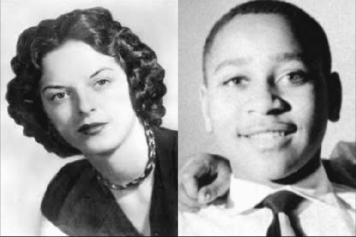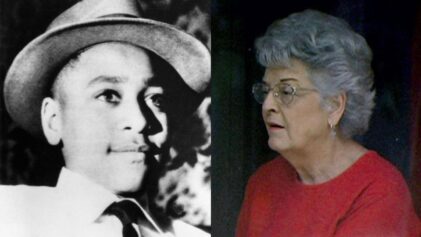The United States Justice Department has officially closed a three-year investigation into the death of Emmett Till, a 14-year-old boy savagely murdered in Mississippi in 1955. Officials were unable to prove that one of the witnesses, pivotal to the case, lied in her testimony.
Author, historian and college professor Timothy B. Tyson, in his book “The Blood of Emmett Till,” said that Carolyn Bryant Donham, the woman at the center of Till’s murder, told him that she lied about the teen ever touching her, making sexual advances toward her and whistling at her.

The Department of Justice’s Civil Rights Division and the U.S. Attorney’s Office for the Northern District of Mississippi, in conjunction with the Mississippi District Attorney’s Office, Fourth District, conducted an investigation to explore the validity of Tyson’s quote in the book. If it were to be found true, it would have given closure to the family and the nation on one of America’s most heinous murders.
Tyson said that he interviewed the woman in his office in 2008, and that at the time, “she handed him a transcript of her sworn 1955 testimony and said, ‘[t]hat part’s not true,’ indicating that she lied.
Because of her testimony, several white men, including Roy Bryant, Donham’s husband at the time, and his half-brother John William (J.W.) Milam kidnapped the young man on the morning of Aug. 28.
The next time anyone would see Till, he would be pulled out of the Tallahatchie River, brutally beaten to death. The men that killed the Black boy for allegedly making a pass at Donham, a white woman, tied his body up in barbed wire, threw him in the river and anchored his body with a 75-pound cotton gin fan.
Bryant and Milam were both charged with the murder, but were acquitted by an all-white jury. After they were acquitted, the two men confessed to the murders in the January 1956 issue of Look magazine. (To read the full confession, click here).
With these new accusations, officials interviewed Donham, the Justice Department reported and asked if she recanted her story. They also asked her if she had information that “would allow [the] prosecution of any living person.”
The woman, now in her 80s, maintains her story from over 60 years ago. She told the FBI that she did not recant her story to Tyson. Tyson, according to authorities, was unable to produce any recordings or transcripts to support his claims that she admitted to lying about the alleged actions of Till.
In a press release, the Justice Department shared its decision: “The government’s re-investigation found no new evidence suggesting that either the woman or any other living person was involved in Till’s abduction and murder.”
The statement continued, “Even if such evidence could be developed, no federal hate crime laws existed in 1955, and the statute of limitations has run on the only civil rights statutes that were in effect at that time. As such, even if a living suspect could now be identified, a federal prosecution for Till’s abduction and murder would not be possible.”
The investigators later spoke to Till’s family, including a family member who saw what happened leading up to the Chicago native’s abduction and murder — to tell them personally the government was closing the case.
The department also sent a letter to the family that stated that their loved one’s historic lynching was “one of the most horrific examples of the violence routinely inflicted upon Black residents.”
Various members of the family shared their thoughts on the decision.
Thelma Wright Edwards, a cousin that knew Emmett as a baby, said to ABC News, “I’m not surprised, but my heart is broken.”
“I pinned diapers on Emmett. I lived with him, he was like a brother to me,” she continued. “I have no hate in my heart, but I had hoped we could get an apology. But that didn’t happen, nothing was settled. The case is closed, and we have to go on from here.”
Rev. Wheeler Parker, also a cousin, said during a press conference, “Today is a day that we’ll never forget.”
He continued, “For 66 years we have suffered pain for his loss, and I suffered tremendously because of the way that they painted him.”
Another cousin, Ollie Gordon, kept her assessment in the modern-day and offered, “I think [there] might have been a different outcome, a different verdict because the world has moved forward.”
More news from our partners:
Young Mogul Turns Beauty Brand Into Million Dollar Enterprise and Empowers Young Women Along the Way

